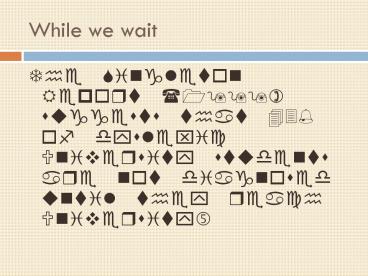While we wait PowerPoint PPT Presentation
1 / 23
Title: While we wait
1
While we wait
- The Singleton Report (1999) suggests that 43 of
dyslexic University students are not diagnosed
until they reach University
2
While we wait 2
- The Singleton Report (1999) suggests that 43 of
dyslexic University students are not diagnosed
until they reach University
3
Contact names
- Jude Elliott
- Allendale Building
- Coach Lane Campus
- Tel 0191 215 6588
- e-mail jude.elliott_at_
- northumbria.ac.uk
- Monica Loughlin
- Northumberland Building
- City Campus
- Tel 0191 243 7687
- e-mail monica.loughlin_at_
- northumbria.ac.uk
4
Exercise 1
- What do you know about dyslexia?
- (5 minutes)
5
Joes Northumbria Journey
6
- Can you tell which student is Joe?
7
Dyslexic/other disabled students registered with
Disability Support
(UK enrolled students Facts Figures 2007/8)
8
Student Life at Northumbria
- Feeling confident
- Meeting new people
- Enjoying the student life
- Id just got used to the timetable and it
changed! - All those rooms look the same
- Everything seems to take me longer than other
students - Working very hardas usual
9
First assignment
I cant believe it. Fail. I worked so
hard Im as surprised as you, Joe, your work
in seminars is excellent. And you are very
articulate. Have you ever thought that you may be
dyslexic? But I can read.
10
Suddenly feeling lost
- Will I be able to stay at University?
- What about a job at the end?
- Will anyone want to employ me?
- All the money
- Self esteem starting to crumble
11
At the School Office
12
At the School Office
- The administrator thinks
He looks very worried and upset hes very
disorganised
13
At Student Services
An appointment is booked with one of the
Disability Advisers
14
At Student Services
- Disability and specific support for students with
dyslexia - Initial Dyslexia Assessment
- ALF
- Welfare
- Counselling
15
You may notice
- Reading
- Student may not wish to read or read aloud in
front of you - Student may not have read instructions or
guidelines
16
You may notice
- In speech
- Student may have difficulties pronouncing multi
syllabic/technical/unfamiliar words - Student may have a tendency to talk not listen
17
You may notice
- In spelling/writing
- Student has poor/inconsistent spelling
- Student has an aversion to writing especially if
observed
18
You may notice.
- In organisation and sequencing
- Student forgets instructions
- Student may lose way round building
19
Good practice
- Focus on one thing at a time.
- Ensure student can see you and what you are
referring to when giving information. - Give the student time to take in
information/answer your question.
20
Good Practice
- Use more than one method for giving information
e.g. back up verbal directions with highlighted
map. - Use pastel coloured paper, sans serif font such
as Arial, Comic Sans. - Consider font size.
- Ensure student knows what is expected of them
summarise information.
21
Pair exercise
Look at your notes from the beginning of the
session. Can you add anything? Will you be able
to try a different approach when you deal with
students?
22
- Journeys end?
23
An excellent future ahead!

